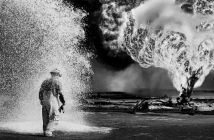Force Majeure (2014)
Cast: Johannes Kuhnke, Lisa Loven Kongsli, Clara Wettergren
Director: Ruben Östlund
Country: Sweden | France | Denmark
Genre: Comedy | Drama
Websites: TIFF
Editor’s Notes: The following review is part of our coverage for TIFF’s In Case of No Emergency: The Films of Ruben Östlund which runs from April 9th to April 14th. For more information on upcoming TIFF film series visit http://tiff.net and follow TIFF on Twitter at @TIFF_NET.
I’ve never been able to get into skiing. Despite growing up in the tundra known as Upstate New York, having more than a passing familiarity with a white landscape, and constantly being barraged by accusatory exclamations of “you don’t ski,” I just haven’t taken to those vehicles of death. There is something about hurtling myself down the face of a mountain perched precariously on two metal strips that I find less than appealing. As I have grown, and my head’s distance from the ground increased, my desire to learn has continued to wane. More obtainable than activities like skydiving, skiing still plays in this same place; riding the line between life and death and reveling in each moment of it. Force Majeure plays off of this sense of impending doom with gleeful effect.
In a lesser film, these wondrous shots of the surrounding would have been of little more than the establishing variety, but writer-director Ruben Östlund understands how to use the very environment to his advantage.
Beginning from a seemingly innocuous place of family vacation, Force Majeure is decidedly unimposing. The camera glides across the smooth terrain as if riding skis itself, taking the care to allow the viewer a glimpse of its full splendor. It’s serene. It’s pleasant. Then comes the bone shaking blast of a canon. And again. These mountain side blasts are a form of remote avalanche control, deploying a sort of controlled chaos that stays a step or two ahead of Mother Nature. While the measured banging comes to a stop, the moment has been ruined, your eardrums continuing to ring, serenity lost. In a lesser film, these wondrous shots of the surrounding would have been of little more than the establishing variety, but writer-director Ruben Östlund understands how to use the very environment to his advantage. Rather than just pretty pictures, he uses the mundane goings-on of a ski resort as a vehicle of foreshadowing to the nature of the film itself.
 For this is a film about nature and reaction. A commentary on how we fit into our world and the effects that our impulses have on everything around us. In Tomas we find our flaw. A man whose broken core is veiled by a sheen of strength. His actions propel the meat of the story forward and his inner fractures spider web through all those with which he interacts. Johannes Kuhnke imbues Tomas with a confidence that flirts with the line of annoyance. There is an air of arrogance to his very walk. This is a man with everything, a beautiful wife and family, and enough wealth to take his family on a lavish ski vacation in another country. He is something of an ideal that we all quietly hate. So as his life begins to crumble and his relationships erode, there is some sense of joy that the audience silently enjoys amongst all of the sorrow. This is a man so confident that he refuses to believe cowardly actions to be his own. But Östlund will not let him off that easily and in his role as director continually holds a mirror to Tomas until he is finally forced to see the man that he has become.
For this is a film about nature and reaction. A commentary on how we fit into our world and the effects that our impulses have on everything around us. In Tomas we find our flaw. A man whose broken core is veiled by a sheen of strength. His actions propel the meat of the story forward and his inner fractures spider web through all those with which he interacts. Johannes Kuhnke imbues Tomas with a confidence that flirts with the line of annoyance. There is an air of arrogance to his very walk. This is a man with everything, a beautiful wife and family, and enough wealth to take his family on a lavish ski vacation in another country. He is something of an ideal that we all quietly hate. So as his life begins to crumble and his relationships erode, there is some sense of joy that the audience silently enjoys amongst all of the sorrow. This is a man so confident that he refuses to believe cowardly actions to be his own. But Östlund will not let him off that easily and in his role as director continually holds a mirror to Tomas until he is finally forced to see the man that he has become.
Throughout its strong strain of emotionality, Force Majeure is bolstered by its exquisite cinematography. Fredrik Wenzel delights in the simply beauty of nature and flits about the ski resort with a steady and palatable delight. However, what is most impressive are the small moments of isolation that he is able to carve out of these brooding mountains of white. His camera, which was once so mobile, is rendered static and he frames the actors so consciously as to create small tableaus throughout. When words are unable to convey the necessary information, he brings us so close to the actors that we can nearly smell their breath. Despite being surrounded, we feel the characters’ solitude. The actors do not just act but live these moments of rapt desperation, free of the burden of dialogue.
Many will find Force Majeure to be maddeningly boring and that is somewhat disappointing, for its mostly slow build is what makes it so effective.
Östlund sets the film at a decidedly deliberate pace. Many will find Force Majeure to be maddeningly boring and that is somewhat disappointing, for its mostly slow build is what makes it so effective. Its beginning is a bit mundane, as the tribulations of an outwardly happy family would be expected to be. But even after the avalanche that acts as the film’s major propelling factor, Östlund chooses not to ramp up the speed. There is an honesty to the way the events are put forth, matter-of-factly and with little pomp. Tomas’ breakdown is gradual despite his family’s sudden sense of abandonment. The more the film trudges along, careless of the feelings of its subjects, the more uncomfortable and upsetting its characters’ actions become. The dissolution of these relationships and the helplessness with which it is carried out makes you squirm and cringe as only a truly honest portrayal can.
Unfortunately for Force Majeure, it all has to come to an end and that is where it falters. Where Tomas’ reaction was excruciatingly gradual, Östlund refuses to allow this to continue, and his moment of revelation is explosive and unnecessarily over-the-top. Everything comes together too nicely and all of the turmoil that was stewing is corrected much too cleanly. Most of the film focuses on the complications of our own impulses but then sacrifices this in order to achieve what is mostly a happy ending. It is as if the film supposes that this can all be fixed, after it spent so much time expressing just how difficult and complicated it all is. It is but one small detraction on what is, for the most part, a supremely well-crafted film. Despite its last minute dalliances with the more simplistic, Force Majeure is a deeply conflicted and complicated depiction of eroding relationships, complimented by fantastic cinematography that manages to be both vast and claustrophobically personal.
Despite its last minute dalliances with the more simplistic, Force Majeure is a deeply conflicted and complicated depiction of eroding relationships, complimented by fantastic cinematography that manages to be both vast and claustrophobically personal.



